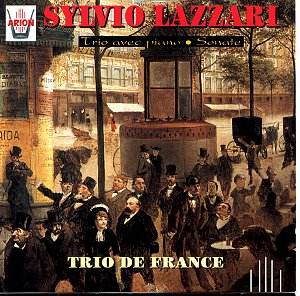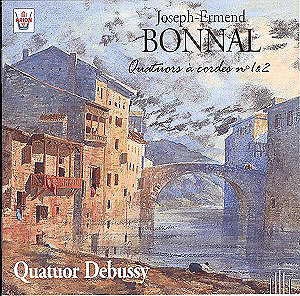 Composer: Sylvio Lazzari (1857 – 1944)
Composer: Sylvio Lazzari (1857 – 1944)
Works: Piano Trio op. 13 in G minor, Sonata for violin and piano op. 24 in E
Performers: Trio de France
Recording: May 1996 at Radio-France Studio 106
Label: ARION 68360
Duration: 75.24
In the landscape of late Romantic music, Sylvio Lazzari emerges as a composer whose works await a more prominent place in the chamber music canon. The recent recording by the Trio de France presents two pivotal compositions: the Piano Trio in G minor, Op. 13, and the Violin Sonata in E, Op. 24. These pieces, while reflective of their era, also reveal a distinctive voice that merits scholarly attention and further performance.
The Piano Trio, Lazzari’s first major opus, is a substantial work that deftly navigates the terrain between introspection and exuberance. The opening movement commences with a somber introduction, characterized by its brooding harmonies that establish a contemplative atmosphere. This is juxtaposed strikingly with the energetic Allegro that follows. Here, the performers exhibit a remarkable commitment to the music’s inherent drama, executing the intricate interplays of melody and accompaniment with precision. The energetic finale, imbued with a sense of triumph, encapsulates the work’s overarching emotional arc, though one notes moments of repetitiveness in the slow movement that slightly detract from its otherwise compelling argument.
The performers’ interpretative choices are particularly noteworthy. The Trio de France delivers a reading that emphasizes the lyrical aspects of the slow movement, imbuing it with a sense of yearning that resonates deeply. Their decision to allow the thematic material to unfold organically enhances the music’s inherent depth. Comparatively, one might recall the interpretations of other chamber ensembles such as the Borodin Trio, whose renderings tend to emphasize a more vigorous approach. The nuanced phrasing and dynamic contrasts employed by Trio de France, however, result in a more intimate and personal expression, which seems more aligned with Lazzari’s intent.
Turning to the Sonata for Violin and Piano, composed later in Lazzari’s life, one finds a different sensibility at play. This work is less about forward momentum and more invested in lyrical exploration. The dedication to the eminent violinist Eugène Ysaÿe adds a layer of historical significance, as Ysaÿe’s advocacy undoubtedly contributed to the work’s longevity. The textures here are less varied than in the Trio; the piano often relies on rippling arpeggios that, while charming, can risk monotony. Nevertheless, the harmonic daring in this work cannot be overstated, with Lazzari employing unexpected modulations and chromaticism that keep the listener engaged.
The engineering quality of this recording merits commendation. The clarity of the sound captures the intricate dialogues between the instruments, allowing each voice to emerge distinctly within the ensemble. The balance is expertly crafted, ensuring that neither the piano nor the strings overshadow one another, a feat that is crucial in chamber music performance.
In terms of historical context, Lazzari’s music reflects the broader influences of the late Romantic period. His time in Paris positioned him amidst a rich tapestry of musical innovation, drawing from the legacies of composers like Franck and Wagner while forging his own path. The emotional intensity and harmonic exploration found in his works serve as a window into the evolving landscape of European music at the turn of the 20th century.
In conclusion, the recording by Trio de France of Lazzari’s Piano Trio and Violin Sonata is a compelling invitation to rediscover a composer whose works are ripe for revival. The interpretations are both passionate and insightful, revealing the depths of Lazzari’s musical language. It is hoped that this recording will inspire performers and audiences alike to engage with these works that are deserving of a prominent place in the chamber music repertoire. As we continue to unearth and champion the contributions of lesser-known figures in classical music, Lazzari stands as a testament to the richness of the late Romantic tradition.
